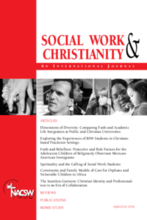Many North American Christians feel compelled to respond to the care and protection needs of children deeply affected by the global AIDS pandemic. This paper provides clear and evidence-based insights into how the Christian community can best direct their efforts.
Institutional care settings (orphanages) are a common response to caring for orphans and at-risk children and youth, but a growing body of global research shows that institutional care presents great social and psychological risks for young children. Among these risks is the reduced ability to form lasting attachments, community stigmatization, and transitional issues related to housing, education, and employment when children eventually leave institutional care.
Balancing links to evidence and to scripture, this paper supports the use of practices that strengthen community and family settings as alternative models of care for offering quality support for children. It includes a detailed discussion of foundational principles and examples of community and family-based models from Africa.
©Social Work and Christianity: An International Journal

